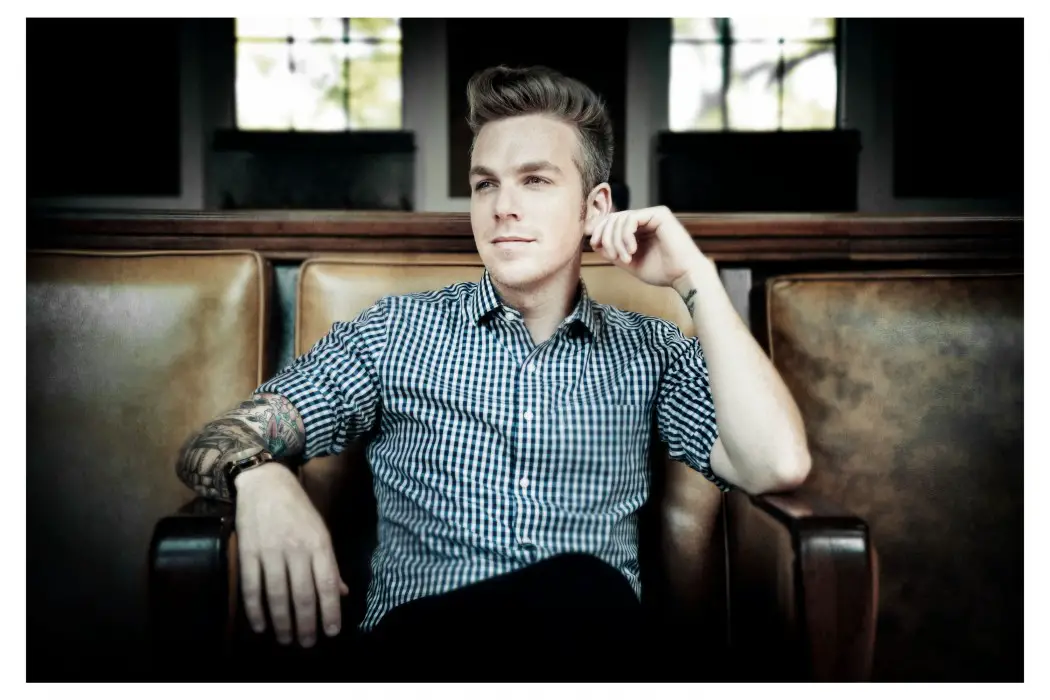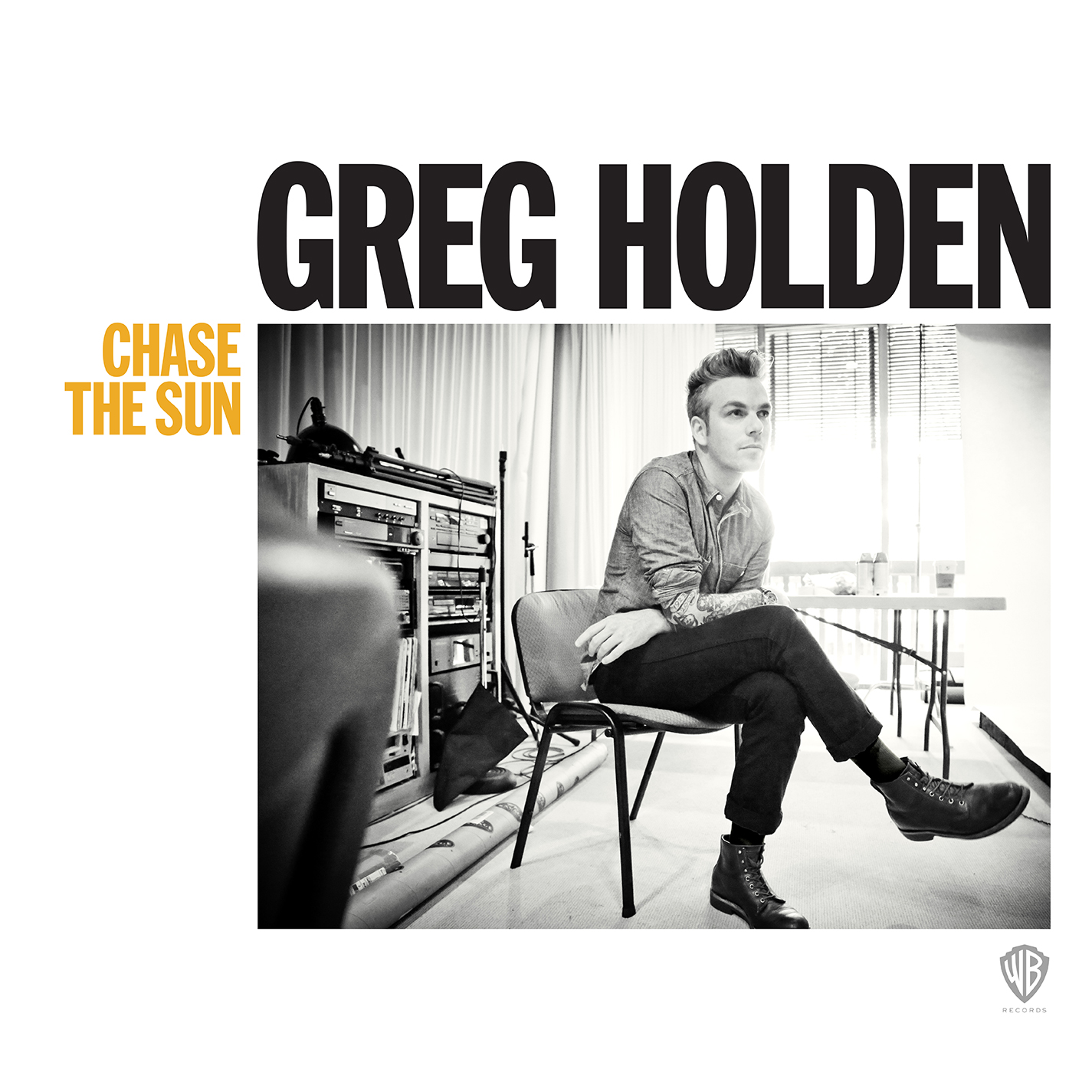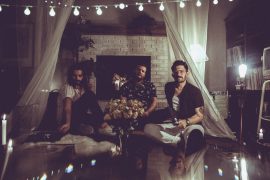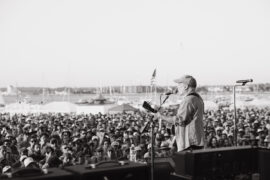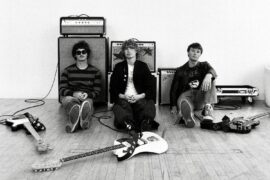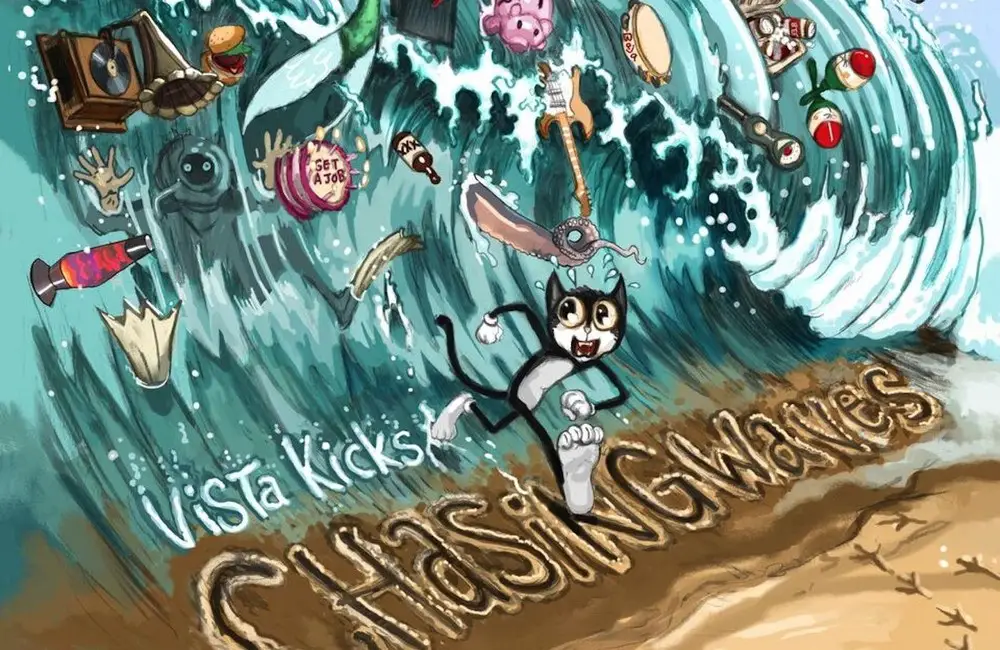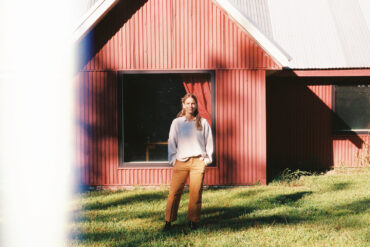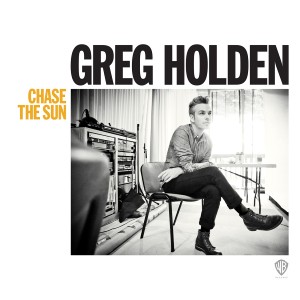
Few artists manage to pull off being as nonchalant and intense as Greg Holden. It is an odd and seemingly contradictory combination of states, but Holden is a man of conviction who has seen rough times and is currently in a bright patch: He released his first major-label album, Chase The Sun, back in April via Warner Bros. Records, and has been touring around it on and off for the last six months. The British-born singer/songwriter emanates an inviting and contagious force of positive energy, both in his demeanor and in his music.
Atwood Magazine featured Greg Holden’s song “Hold On Tight” earlier this year, describing it as “one part rock ballad and two parts arena anthem. Not only does it offer a meaningful take on life, but it’s also infectiously catchy and fun to sing along to. From the opening strum to the final chorus, Greg captivates listeners with his positive, celebratory lyrics and a big, folk-rock sound.” On record, he is dynamic; in concert, he is intimate; in person, he is both.
Chase The Sun is easily one of the best, yet sadly overlooked and underrated releases of the year. But – as has been previously noted – that’s how it happens for many artists: Rather than shooting to “stardom” and fighting to remain relevant, Greg Holden is steadily gaining attention, amassing an ever-increasing and dedicated following through word-of-mouth, touring, and media. His song “Boys In The Street” has been gradually earning immense applause and recognition for its powerful LGBTQ message recounting Holden’s personal experience with homophobia within his own family.
Greg Holden is that complicated treasure you’ve been waiting to find. I, for one, found him a few months ago, lazing at a booth in the ritzy W New York’s bar in Union Square. After bonding over our mutual warm weather allergies, Greg and I got to discussing music, philosophy, and many other facets of life, remembering to sip our overpriced wine only during the briefest of pauses in conversation. A humble fellow, Greg Holden has so much to say, and while he won’t readily admit it, he wants to be heard. Luckily for him, people are starting to listen.
Watch: “Boys In The Street” – Greg Holden
[youtube=https://youtu.be/rcZLMtWEcF0?t=0s]
A GLASS WITH GREG HOLDEN
Atwood Magazine: Greg, nice to meet you!
Greg: You too, man.
Part of the crux of your story is that it almost didn’t happen… But now you’re here.
Greg: Now I’m here: I’m alive, I made it! For me, I’ve always really cared about my integrity and what I do – you know, it’s always been very important to me to do what I feel is important – to say something that I am very passionate about. And for a long time, I didn’t make any money from this – and that’s fine; i wasn’t looking to make money – but I was looking to at least be able to sustain myself. I got to a point my career about three years ago where I was doing a tour of Europe and it was sold out – we had all these great shows – and I was hemorrhaging money; I couldn’t stay afloat! It’s fine if you’re playing to two or three people a night and you’re like, “Why can’t I survive?” But when there’s 300 people at your shows and you can’t pay for the gas in your car, you really have to ask yourself, as an adult, a serious question: “How can I do this?” So, you know… I hit a point where I was like, “I don’t know if I can do this!”
Was that one of the situations where the tour was too big for its customers, or was there something else at play?
Greg: No, it was just… I don’t know what it was. I didn’t have a crazy overhead; there was only me, my drummer, a bass player, and a guitar player. That was it! It wasn’t a crazy tour: We didn’t have lights and we didn’t have a sound guy. It was very, very low budget – about as low budget as I could possibly imagine doing it, and that was what was frustrating me. It was like I had eighteen people in my crew, you know? It was like… “How am I supposed to do this?” And then thankfully, a blessing came and I had a song that Phillip Phillips cut of mine, called “Home,” which – you know – blew up! Financially, that allowed me to continue to do what I wanted to do without compromising my integrity – which is all I ever really wanted.
Watch: “Home” – Phillip Phillips
[youtube=https://youtu.be/HoRkntoHkIE?t=0s]
When you say 'continue to do what I wanted to do,' do you mean specifically as a musician, or do you mean touring?
Greg: I mean as a musician, to make the music that I want to make without feeling like I need to appease an audience or a label, or a business; I just wanted to make the music that I wanted to make, because it’s very easy to get pushed into a certain direction by labels and by people around you, and I never wanted to do that. My music isn’t the kind of music that I think will immediately jump into the charts, so it takes a second. I just wanted to financially buy some more time for myself, which so far is happening!
My music isn’t the kind of music that I think will immediately jump into the charts.
Are we in an off-tour cycle right now?
Greg: I have a week off. It’s amazing! I’ve not been home for this long in months and months. I’m like, “I’m home! I don’t know what to do with myself!” [laughs]
What do you do during your free time?
Greg: I stay at home, I cook, drink wine, and I don’t leave my neighborhood. I live in Park Slope in Brooklyn, and I don’t leave.
What do you like to cook?
Greg: I’m very much into Indian food, but… I’m also experimenting with lighter dishes. I started making zucchini noodles and zucchini spaghetti, and stuff like that.
That sounds delicious - we should have done this at your place!
Greg: [laughs] Yeah, right!?
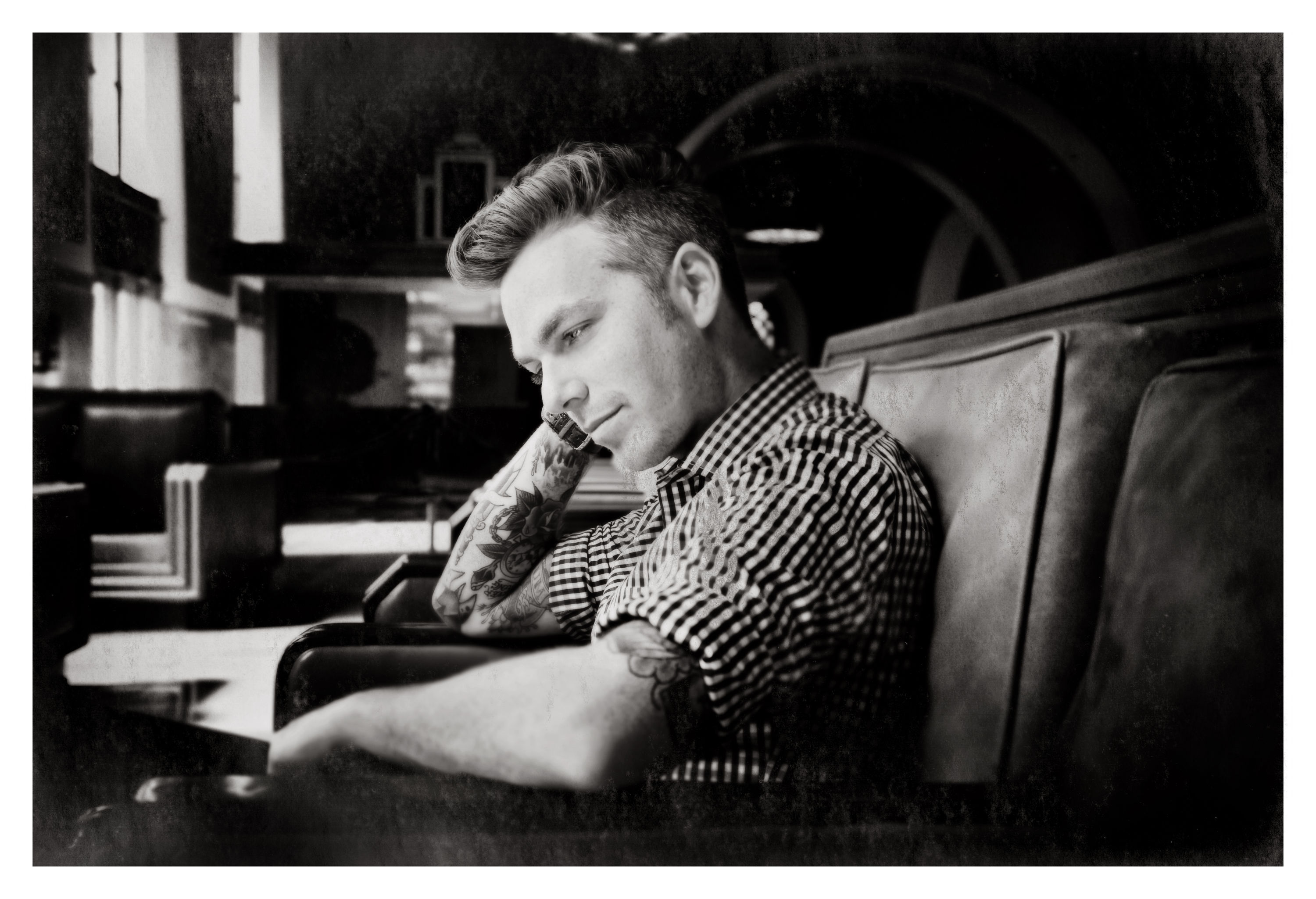
Your music - songs like 'Lost Boy' and 'Boys In The Street,' they've come to take on a special significance and deeper meanings. How do you view your role as a musician in society?
Greg: I don’t know, because I don’t want to take myself too seriously; I will let the music do the talking, and if people want to take a serious meaning from it, then amazing! That’s all I can ask for; but I really try not to take myself too seriously. I like to think that I’m saying something a bit more substantial than your typical love song – but again, I would like to leave that to the listener, to be honest.
Listen: “The Lost Boy” – Greg Holden
[soundcloud url=”https://api.soundcloud.com/tracks/31044862″ params=”color=ff5500&auto_play=false&hide_related=false&show_comments=true&show_user=true&show_reposts=false” width=”100%” height=”166″ iframe=”true” /]
I once took a songwriting class where the instructor said, 'Whatever you do, don't sing directly about love.'
Greg: I would say that’s good advice. I just don’t sing about love at all – or maybe universal love. Yeah, I was never turned on by love songs; it never did anything for me. I was always a big fan of the artist who sang from a more social commentary side of things, like Bruce Springsteen, Tom Petty, Bob Dylan – those were the guys that got me. They were singing about racism, sexism, inequality, and stuff like that. For me, that makes me feel something, so I immediately wanted to write songs like that.
Where does that come from?
Greg: I don’t know… I came from a working class background, and I didn’t have a great upbringing – I had a pretty shitty relationship with my stepfather, and I had to deal with bullying a lot at school… You know, the north of England was very much a – we didn’t have a lot of money where we grew up, so it was very easy to notice a lot of things, and get to know about a lot of things. I don’t know – and then I just got down into the kind of music that really enriched me. It made sense to me that I wanted to sing about what I thought was more important; whether I’m doing that or not is up to the listener, but I hope that I’m doing that.
I was listening to 'Boys In The Street' today, and I remember how when I last saw you live, and you told your story and played that song, the crowd exploded at that last chorus. My heart trembled... How did that feel for you?
Greg: It feels amazing, and thankfully that happens almost every time. Nine times out of ten, and that is the greatest feeling in the world, because I didn’t write that song to be cool; I didn’t write that song to try and appease a certain audience; I wrote that song because I really felt and believed in what I was saying. When an audience reacts to that, that’s really all you can ask for as a songwriter. I mean, it feels amazing! Fucking incredible… I can’t say anything else about it; that’s how it feels. I’m just grateful that’s how people react!
It's a very intimate relationship that you establish with the audience in a very short amount of time.
Greg: Yeah, it is – and I am very grateful for that reaction, because it could go another way – and it’s also very hard to sing that song – it’s happened a couple of times where people just aren’t listening, and I believe so strongly in that song and feel so passionately about it, that when people don’t react that way, or just don’t listen… It’s kind of hard, because I really care about that song and when I’m singing it and people aren’t listening, it’s a very hard thing as a songwriter to deal with.
So for you, there's a lot of importance on the meaning of the songs.
Greg: Yes – it’s not just about a hook and trying to keep people dancing or moving; for me, it’s very lyrical, so I shouldn’t feel this way but sometimes I’m like, “Aw God dammit! Just listen to my words, please! Listen to me.” But that’s the struggle of an artist; that’s fine – I expect to deal with that shit, but for me, it’s very important that people listen to the words – like, if you listen to “Boys In The Street” and you don’t listen to the whole thing, it doesn’t make any sense! The ending is the part that makes it all come together. If people don’t listen to that, then they miss the point, but that’s the battle. It’s trying to get them to listen. I don’t expect people to listen – I’m the opener most of the time now; I’m the underdog – no one knows who I am! And that’s the interesting challenge: Getting people to listen.
For me it’s very important that people listen to the words.
I was very impressed that you were able to establish yourself in such a short amount of time, so good job! You're doing something right, I think.
Greg: Thanks! Thank you.
Listen: “Hold On Tight” – Greg Holden
[soundcloud url=”https://api.soundcloud.com/tracks/199891871″ params=”color=ff5500&auto_play=false&hide_related=false&show_comments=true&show_user=true&show_reposts=false” width=”100%” height=”166″ iframe=”true” /]
I don't remember if you told a story about 'Hold On Tight,' but I've been singing that song nonstop - Don't take your life for granted - where did that come from?
Greg: I got to a point in my life a few years ago where I didn’t really feel connected to the music I was writing anymore; I feel like I changed a lot as a human being. My last record was quite negative and quite pessimistic and angry, and I wasn’t that person anymore. I kind of hit a wall in my life and my career where I was like, “I… need something to jolt me into a different direction; I need an electric shock.” So I went to India! I went on a trip to India and Nepal for eight weeks, and it gave me this massive shift of perspective in a great way. I came home and I wanted to immediately write a song that made people feel like they appreciate what they had. I live in a really bougy neighborhood in Brooklyn, you know? And the first thing I noticed in India was how much people were smiling, and how little they had. Then I came back to Park Slope, and I realized how everyone has everything, but then no one is smiling. And I was like, “What the fuck? We have not got this shit figured out,” so I just wanted to write a simple song that had a message that was just like, ‘Don’t take your life for granted. Live in the moment; appreciate what you have.’ I was mostly saying it to myself, but trying, in a way, to help people feel that way, too.
I like that a lot; I live by a similar philosophy.
Greg: We’re so lucky, man! We’re so lucky, and we don’t realize it!
I wanted to immediately write a song that made people feel like they appreciate what they had.
My boss likes to say, 'You know, in the end everybody's going to die.'
Greg: It’s true. The one thing that we know for sure in our lives is the only thing that we know for sure: That we’re going to die. We don’t know if we’re going to get our raise; we don’t know if we’re going to make a million dollars; we don’t know if that next drink will kill us or not; but we know for sure that at some point, we’re going to die.
[to this last point, Greg and I raised our glasses in a toast] Cheers!
And in the West, we’re trained from birth to be terrified of death. I noticed in the East, they don’t; they celebrate it – people are sad, of course; it’s the end of someone’s life, but why does it have to be this thing that we’re almost scared to talk about? People are scared to talk about death here; it’s weird. I get it – you know; I’m scared about it, too. I’m trying to get better at realizing that it’s just a part of life.
It's true. Your entire album is such an embrace the moment album, and that shine - that smile - that starts with the first note of the first song, it goes throughout.
Greg: Thanks. That’s what “Chase The Sun” means. “Chase The Sun” is about looking forward and looking up. And that’s it. It’s not… I don’t know; I wanted to write an album that was less self-indulgent, and that was more like a universal album – something that everyone could relate to. Hopefully that happens!
Did you feel pressure when writing this album?
Greg: Not really, because thankfully I did’t have a label at the time; I was totally alone. I didn’t have anyone breathing down my neck for songs, and like I said, I was in that moment where I could take it or leave it at that point, so I didn’t feel pressure. Now I feel pressure! Now I’m signed to Warner Bros., and there’s a lot riding on the success of this album for sure, from people around me and from myself, and I feel a little bit of pressure for sure, but it’s good to have a little bit of that. You need something to drive you along.
How does the tour through the States and your experience over the past couple of months compare to the European tours you were doing before?
Greg: Well up until now, I’ve never really played with my band! I’ve never had a chance to rock out and play with my full band, and this is the first time – thanks to Warner – that I’ve been able to go one the road and play with my band. That’s really how I’ve always wanted to represent my music live. I feel like in the last five or six years that I’ve been doing this, I’ve been constantly compromising. How can I make two people sound like five people? This is the first time where I can take my band and we can actually realize this album, so it’s not really about a difference between a European or American tour – it’s just that this is the first time I’m doing it the way that I want to do it.
One thing that I noticed from the band's performance - besides that they're very tight; you've got them whipped into shape - is on 'It'll All Come Out,' that's one of the few times that there is a riff in the music. It's striking in that way, like it's a different song from the rest.
Greg: That’s true, yeah… I never really thought about that, actually. My friend Tofer Brown and I, we wrote “Hold On Tight” together, and that was the first song we ever wrote together. The second song we ever wrote together was “Bulletproof,” and the third song we ever wrote together was “It’ll All Come Out.” I guess we were kind of tapping into something – we don’t really know what it was – but I was listening to a lot of The Rolling Stones and Tom Petty at the time, and I think I tried to maybe channel some of that, I guess? Maybe that’s where it came from, I didn’t really think about it… In fact, when I first wrote that song, I don’t think there was even a guitar solo or a riff in it. When I produced the album, we got a guitar player who came in, and the producer was like, “Oh! We should put a guitar solo in,” and then we did!
It stands out because there isn't much of that on the rest of the record.
Greg: No, not at all, actually.
Are you finding that, with the band, you're getting more ideas for music?
Greg: I think so; I think I’m writing now more towards the live show with the band. I think on my last album, I was writing from a singer-songwriter’s, guy-on-his-own point of view. Now, I’m enjoying the live thing so much with the band, that the song I’m writing now are definitely more geared toward the live band setting; that’s definitely affecting the way that I write.
So you've been writing on the road?
Greg: No, not at all! [laughs] I like the idea of writing on the road, and being the guy who’s backstage with his notepad, but really there’s not enough time. Plus I don’t write a lot of songs, so… I’m not a prolific songwriter; I don’t write a lot of songs. I have a very strong belief in quality versus quantity, so I’m not one of those songwriters who just writes and writes and writes. So yeah, I don’t really generate that much stuff on the road.
I tend to doodle - I'll have a hundred different little snippets of lyrics, and then they're just there.
Greg: Oh yeah, I have so many unfinished songs. It takes a lot – when I finish a song, it’s like a moment. I have to go out and toast to myself. “Wow! I finished a song, you guys!” And I send my manager an email like, “Look! I finished one!” And it happens like, every three or four months; it’s crazy.
Who do you typically go to when you first finish a song?
Greg: I send it to my manager right away. If he likes it, we’re good to go.
How long have you been together?
Greg: Eight years.
So he's seen you through thick and thin?
Greg: Yeah, he worked for free for many, many years. He’s my hero; he believed in me when no one else did.
If memory serves, I remember you saying that you got into music a little bit later than most.
Greg: Yeah, I was eighteen. I wish it was earlier because I’d probably be a much better musician, but yeah – I was eighteen. For me, music wasn’t really this thing that I was trained to do. I didn’t have a musical family or anything; it was like an escape route. It was my way of escaping my life at the time.
What is it for you now?
Greg: That’s a good question… Music to me now is more of a way of speaking my frustrations with the world. Voicing them in a way that they maybe will be heard… I think that’s what music is to me now. It’s changed, and now I’m just trying to say something important. Whether I’m saying something important or not is up to the listener, but that’s what I’m trying to do, at least.
Music to me now is more of a way of speaking my frustrations with the world… I’m just trying to say something important.
What did you want to do when you were young?
Greg: When I was younger? I wanted to be a golfer. I was playing golf religiously… God that’s so weird to think about; yeah, I was playing golf. It’s so funny – my family, when we moved into a new house, they got me this golf membership and I was like, “Golf?! I don’t want to play golf.” And then I got into golf and I really loved it – this is such a boring story, wow… And then I played it so much for like, five years, that they said I was playing golf too much; I had to get a job. I went, “What are you talking about? You guys made me play golf!” So then I quit golf and started working at McDonald’s.
A golfer-gone-McDonald's-gone...?
Greg: Gone supermarket employee –
- gone rising music starlet.
Greg: Yeah, exactly.
Did you always have the taste for the hair?
Greg: I had emo hair for as long as I can remember – just the sweep across Justin Bieber haircut for as long as I can recall. I was in emo bands – I was a metalhead! I was into metal, hardcore, punk, emo…
Where did the singer/songwriter thing come from?
Greg: That came out of my… I’m a control freak, and it came out of that. No one can tell me how to write a song or how to act, and I think being in a band was very frustrating for me, because – it’s a bad quality of mine – but I didn’t want anyone to tell me what to do. I still am like that, so thank God I’m a lone wolf in this. I eventually decided that I wanted to do my own thing, because I didn’t want to compromise anything. I don’t know if that’s a good quality or not.
Was that emo time where the tattoo sleeves come from?
Greg: No, these are recent! I had a few tattoos, but these are mostly over the last two or three years.
What's your favorite tattoo?
Greg: My granddad. I got it in Holland by this tattooist called Errol. He was a world-famous tattooist, and I was playing a tour in Holland. I knew about Errol and I knew he had a waiting list of like six months, and my friend calls me saying he managed to get me a slot the next day, and asking if I wanted to do it. So I accepted – it was my day off on tour! So I got this massive tattoo and the next day I played a show in Amsterdam and I couldn’t move my arm. I remember trying to play guitar, and it hurt so much!
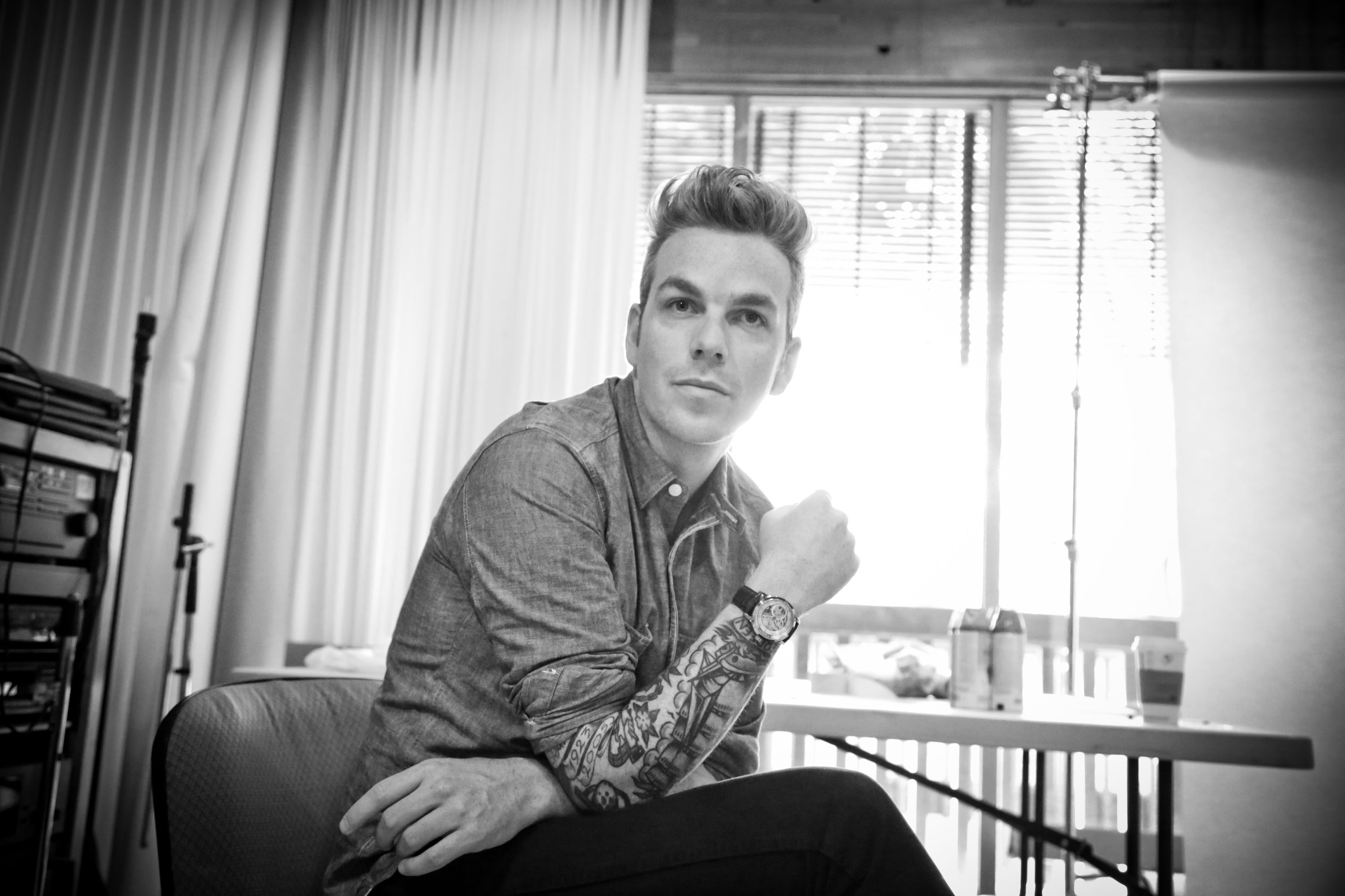
What's been the best part of this new chapter in your music career?
Greg: I think the best part of it is being forced to realize that I’ve fulfilled my dream. It sounds cheesy – you asked me a cheesy question, I gave you a kind of cheesy answer. But the reality is, it’s not really, because people, I think realize their dreams all the time, but they don’t realize that they’ve realized them. We’re too caught up in all the bullshit and the noise in life that it’s very hard to sometimes even notice. My goal in my life was to make music for a living and travel, and I’m doing it, but it’s so easy for me to complain! It’s so easy for me to be like, “I’m tired!” or, “I’m hungry!” or, “I don’t want to go to that town because it’s not fun!” but the reality is I’m totally doing what I wanted to do my whole life. And I think so many people are doing that and don’t realize it. It’s something that we should all try, every day, to kind of… Again, it goes back to ‘don’t take your life for granted.’ Look at this place! [gestures around us] Everyone here is in New York! They probably all are from not-New York, and their dream was to live in New York, and work in finance, or work in design, or fashion, or media. And everyone’s doing it, but everyone faces their shit every day: “Oh, I have to get on the subway,” “I can’t really afford my rent,” but the reality is we’re all living our dream right now.
I think the best part of [this chapter in my career] is being forced to realize that I’ve fulfilled my dream.
I think there's something innate about the human condition to always be questioning what you're doing, and to look at the negative before the positive.
Greg: Exactly, and that’s kind of what that song is supposed to be about – to help people realize that, yeah: Of course there’s negatives! Of course this drink shouldn’t be eighteen dollars! Of course maybe that guy is looking at me funny – even though he’s not; I just made that up for an example, but – you know, there’s things that we could very easily find the negative in, but look how many beautiful things there are around us. We’re trying this wine that’s from a different country; it’s fucking beautiful outside; we can breathe; we’re not living in a dictatorship – no one’s trying to kill us (yet); we have access to food and water – these are beautiful things that we totally take for granted. We’re in the five percent of the world that we even have this! We’re drinking bougy wine in a bougy bar around bougy people: That’s a fucking miracle! Cheers.
Atwood Magazine wishes Greg Holden the best for his music career.
You can follow Greg Holden on Facebook, Twitter, and Instagram
Greg Holden Fall 2015 Tour
remaining dates // * with Vintage Trouble
10/14 Music Farm – Charleston, SC*
10/16 Cannery Ballroom – Nashville, TN*
10/17 Mercury Ballroom – Louisville, KY*
10/18 Saturn – Birmingham, AL*
10/20 Terminal West – Atlanta, GA*
10/21 Cat’s Cradle – Carrboro, NC*
10/23 Webster Hall – Marlin Room – New York, NY*
10/24 Brighton Music Hall – Boston, MA*
10/25 Theatre of Living Arts – Philadelphia, PA*
Tickets available at gregholdenonline.com

